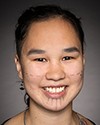Matna. Thank you, all, and thank you for the opportunity. I really appreciate it and the time and space here.
We have thought of great things happening, and of course we know that in this amendment we're looking at indigenous languages and ensuring that we see that on the ballot. Bill C‑19 is about protecting democracy. It's about ensuring that indigenous peoples can be included in the voting process.
I look and think of my riding in particular where about 84% or 85% of the constituency is Inuk and where for the majority of those people, about 60%, their mother tongue is Inuktitut. That's not including whether or not they actually speak the language, that is just encompassing their first language. Nunavut in particular can be viewed as an already very indigenous language-based riding, if you will.
What we're talking about is expanding that and making that more entrenched in our actual policies and the things that we do to ensure that we can see indigenous peoples included in this democracy. Keep in mind that while I have spoken a bit about my riding specifically, there are ridings all across the country that are in the same situation. If we're talking about reconciliation and the need for promoting that, the need for promoting indigenous languages, this is an amazing opportunity of course to be able to do that as well, and it should quite frankly already have been something that's in place. I'm really glad that we're here at least starting the conversation and really have an opportunity to do some really cool stuff and create some change.
We know that the Commissioner of Nunavut has stated that indigenous people's voter turnout reduces when their language is not available on the ballot. We know that Minister LeBlanc acknowledged that a broad view is needed as to what's in the scope of Bill C‑19 and said that the government will not object to something beyond the scope of the legislation if it's designed to further our collective best efforts to come up with the right mix of measures.
Again, this is something that should already be available. We should already be encouraging this. If the federal institution is really invested in reconciliation, here's an action item that we can do to show that to the rest of Canada. We also need to ensure that indigenous peoples like the Inuit can be included in the democratic process.
It was basically on day one of my election where people thought it was my fault as a newly elected member of Nunavut that there was no availability for them to vote in their language. There were so many elders and others who came up to me who said, I wasn't sure if I even voted right, or I decided not to vote. We can't have that happen because people can't have those kinds of clear barriers, and we can be lifting those up.
I really look forward to seeing support for this. Indigenous language is something that is so incredibly important and should be a priority to everybody here on the committee. You have all seen me talking about reconciliation and those talking pieces. Here's an action item. Here is something concrete to do to make change. It's so important that we ensure Inuit and indigenous peoples are included as a part of the democracy.
Let's take it a step further and show them that Canadians also want to learn about indigenous people, want to learn about indigenous languages, want to promote those kinds of things and want to see pride in that. This is Canadian history. This is Canadian people where indigenous peoples are the first of this country. These are the original languages of Canada. Why aren't they on the ballot? Today is an opportunity to see some of that change, to see that availability to be able to actually make change and progress and move forward altogether.
Thank you so much again for the opportunity to be able to speak.
I'll just leave you with this. Imagine if your voters could not vote in English or French. That is very much a situation similar to what many indigenous peoples are facing.
I look forward to your support, and of course this amendment is about ensuring everybody is included in this process, and we want to ensure that happens to the best of our ability.
Thank you, everybody, and I look forward to that support.
Matna.




